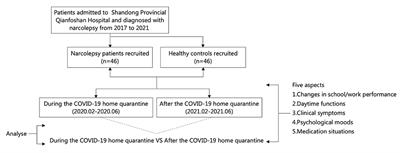Imagine this scenario: You’re sitting in a classroom or at your desk at work, feeling the weight of exhaustion pulling at your eyelids. You struggle to stay awake, but your body has other plans. This is the reality for many individuals living with narcolepsy, a chronic sleep disorder that affects their ability to stay awake and alert during the day. In this article, we will explore how narcolepsy impacts work or school performance and discuss ways to manage this condition effectively. So, grab a cup of coffee and let’s dive in!
Living with narcolepsy can be challenging, especially when it comes to work or school. Imagine trying to concentrate on a lecture or meeting while your brain is desperately urging you to fall asleep. It’s like battling against a powerful current, constantly fighting to stay awake. This constant struggle can have a significant impact on your performance, productivity, and overall quality of life. Whether you’re a student trying to absorb new information or an employee trying to meet deadlines, narcolepsy can make these tasks incredibly difficult. But fear not! There are strategies and accommodations that can help individuals with narcolepsy navigate their work or school life more effectively. So, let’s explore the world of narcolepsy and discover how to overcome its challenges!

How Does Narcolepsy Impact Work or School Performance?
Narcolepsy is a neurological disorder that affects the brain’s ability to regulate sleep-wake cycles. It is characterized by excessive daytime sleepiness, sudden and uncontrollable episodes of sleep, and disrupted nighttime sleep. This condition can have a significant impact on a person’s ability to perform well at work or school. In this article, we will explore the various ways in which narcolepsy can affect work or school performance and discuss strategies for managing the condition.
1. Difficulty Maintaining Alertness
One of the primary challenges faced by individuals with narcolepsy is difficulty maintaining alertness throughout the day. The excessive daytime sleepiness that accompanies this condition can make it challenging to stay awake and focused during work or school hours. This can lead to decreased productivity, poor concentration, and an increased risk of accidents or errors.
Managing this aspect of narcolepsy requires implementing strategies to promote wakefulness. This may include scheduled naps during the day, engaging in physical activity, consuming caffeine in moderation, and creating a sleep-friendly environment at night to ensure restorative sleep.
1.1 Napping as a Coping Mechanism
Napping can be an effective coping mechanism for individuals with narcolepsy. Short power naps of 10-20 minutes can help alleviate sleepiness and improve alertness. However, it is important to plan these naps strategically to avoid disrupting nighttime sleep. Napping too close to bedtime can make it difficult to fall asleep at night, exacerbating the sleep disturbances associated with narcolepsy.
Additionally, it may be beneficial to communicate with employers or school administrators about the need for scheduled naps. By understanding the challenges faced by individuals with narcolepsy, accommodations can be made to support their performance and well-being.
2. Impact on Memory and Cognitive Function
Narcolepsy can also have a significant impact on memory and cognitive function. The disrupted sleep patterns and excessive daytime sleepiness can make it difficult for individuals to consolidate and retain information. This can be particularly challenging in academic settings where students are required to learn and recall large amounts of information.
To mitigate the impact on memory and cognitive function, it is important for individuals with narcolepsy to establish effective study habits. Breaking down information into smaller, manageable chunks, using mnemonic devices, and practicing active recall techniques can help improve retention and recall. Additionally, ensuring adequate sleep and managing sleep disturbances can contribute to enhanced cognitive functioning.
2.1 Strategies for Focus and Concentration
Individuals with narcolepsy may experience difficulties with focus and concentration due to the constant battle against sleepiness. To improve focus and concentration, it can be helpful to break tasks into smaller, more manageable segments and establish a structured routine. Eliminating distractions, such as noise or excessive visual stimuli, can also aid in maintaining attention. Additionally, some individuals find that engaging in regular physical exercise can help promote alertness and improve cognitive function.
3. Emotional and Psychological Impact
Living with narcolepsy can have a significant emotional and psychological impact on individuals. The challenges faced in managing the condition, such as coping with sleepiness and potential social stigma, can lead to feelings of frustration, anxiety, and depression. These emotional factors can further impact work or school performance.
It is important for individuals with narcolepsy to seek support from healthcare professionals, support groups, and loved ones. Cognitive-behavioral therapy (CBT) can be beneficial in addressing any psychological distress associated with the condition. Developing effective coping mechanisms and stress management techniques can help individuals navigate the emotional challenges and improve overall well-being.
3.1 Supportive Environment and Open Communication
Creating a supportive environment at work or school is crucial for individuals with narcolepsy to thrive. Open communication with supervisors, teachers, and peers can help foster understanding and empathy. By educating others about narcolepsy and its impact, individuals with the condition can gain the support and accommodations necessary to perform at their best.
Furthermore, a supportive network of friends and family can provide emotional support and encouragement. Sharing experiences and seeking advice from others who have faced similar challenges can be empowering and reassuring.
By understanding the ways in which narcolepsy can impact work or school performance, individuals with the condition can take proactive steps to manage their symptoms and optimize their performance. Through a combination of lifestyle modifications, effective coping strategies, and a supportive environment, it is possible to navigate the challenges posed by narcolepsy and lead a fulfilling and successful academic or professional life.
Key Takeaways: How does narcolepsy impact work or school performance?
- Narcolepsy can significantly affect a person’s ability to concentrate and stay awake during work or school.
- Excessive daytime sleepiness is a common symptom of narcolepsy, making it difficult to stay alert and focused.
- Narcolepsy can lead to sudden and uncontrollable sleep attacks, which can interrupt work or class activities.
- Memory and cognitive function may be impaired in individuals with narcolepsy, affecting their learning and performance.
- Managing narcolepsy through proper medication, lifestyle adjustments, and support can help improve work and school performance.
Frequently Asked Questions
How does narcolepsy affect work performance?
Narcolepsy can have a significant impact on work performance. People with narcolepsy often experience excessive daytime sleepiness, which can make it difficult to stay awake and alert during working hours. This can lead to decreased productivity, difficulty concentrating, and an increased risk of making mistakes. The sudden onset of sleep attacks, a hallmark symptom of narcolepsy, can be particularly disruptive in a work setting. These uncontrollable episodes of falling asleep can occur at any time, making it challenging to maintain a consistent work schedule and complete tasks on time.
In addition to excessive sleepiness, narcolepsy can also affect cognitive function. Memory problems, difficulty with decision-making, and impaired problem-solving skills are common cognitive symptoms of narcolepsy. These can further hinder work performance by making it harder to learn new information, adapt to changes in the work environment, or effectively communicate with colleagues. Overall, narcolepsy can have a profound impact on work performance and may require accommodations or adjustments in order for individuals with narcolepsy to succeed in the workplace.
How does narcolepsy impact school performance?
Narcolepsy can significantly impact school performance, especially for students who are undiagnosed or have not received appropriate treatment. Excessive daytime sleepiness, a core symptom of narcolepsy, can make it challenging for students to stay awake and engaged during classes. This can result in missed lectures, difficulty concentrating, and poor academic performance. Sleep attacks, which are sudden episodes of falling asleep, can also occur during school hours, further disrupting a student’s ability to focus and participate in class activities.
In addition to the physical symptoms, narcolepsy can also have a psychological impact on students. Feelings of embarrassment or shame related to narcolepsy symptoms, such as falling asleep in class or experiencing cataplexy (sudden loss of muscle tone), can affect a student’s self-esteem and overall well-being. This, in turn, may contribute to increased anxiety or depression, which can further impede academic performance.
It is important for students with narcolepsy to receive appropriate support and accommodations in the school setting. These may include flexible scheduling, extended time for exams, or access to quiet spaces for naps during the day. With the right support, students with narcolepsy can overcome the challenges they face and thrive academically.
Final Summary: The Impact of Narcolepsy on Work and School Performance
Living with narcolepsy can significantly impact an individual’s work or school performance. The unpredictable nature of narcolepsy symptoms, such as excessive daytime sleepiness and sudden sleep attacks, can make it challenging to maintain focus and productivity. This condition can disrupt daily routines, causing difficulties in meeting deadlines, staying alert during classes or meetings, and completing tasks efficiently. However, with proper management strategies and support, individuals with narcolepsy can still thrive in their work and academic pursuits.
One of the key challenges faced by individuals with narcolepsy is the negative impact on their sleep quality and quantity. Sleep disturbances, such as fragmented nighttime sleep and frequent awakenings, can lead to daytime sleepiness and fatigue, making it harder to concentrate and perform optimally. It is crucial for individuals with narcolepsy to establish a consistent sleep schedule, prioritize quality sleep, and create a sleep-friendly environment to minimize the impact on their daily functioning.
Moreover, seeking accommodations and support systems can make a significant difference in managing narcolepsy’s impact on work or school performance. Open communication with employers, professors, or academic advisors about the condition can lead to understanding and the implementation of reasonable adjustments. These may include flexible work or class schedules, access to napping areas, or the use of assistive technologies to aid concentration. By advocating for their needs and utilizing available resources, individuals with narcolepsy can overcome the challenges and excel in their professional or educational endeavors.
In conclusion, narcolepsy can pose obstacles to work and school performance due to its disruptive symptoms. However, with proactive management strategies, including maintaining a healthy sleep routine and seeking necessary accommodations, individuals with narcolepsy can mitigate the impact and continue to achieve success in their chosen paths. By fostering a supportive environment and embracing self-care, individuals with narcolepsy can navigate the challenges and thrive in both work and educational settings.


